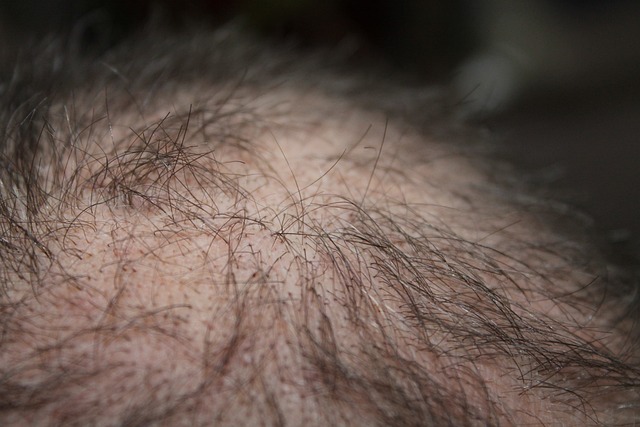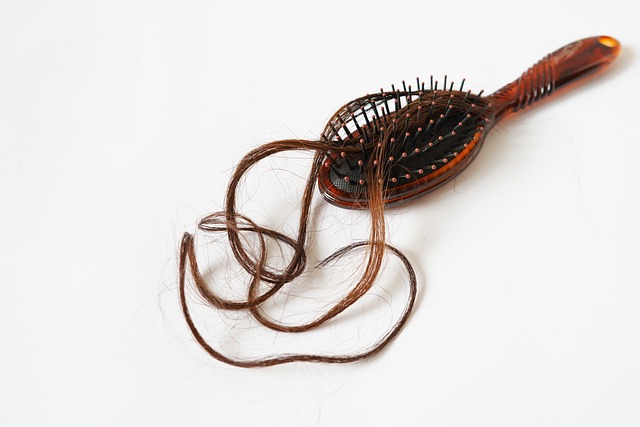
Attention Women With Fine, Wispy Hair… an Increasingly Visible Scalp… and Straw-like, Damaged Strands…

An Amazing Hair Secret Discovered By A Heartbroken Mother Boosts Your Hair Growth By Up To 89% And Regrows Your Natural
If you’ve found yourself asking the query “Why is my hair falling out?” or noticing the first symptoms of hair thinning, you are no longer on your own. Hair loss is a commonplace problem for both males and females and may result from an expansion of things. It’s essential to understand the capacity causes behind your hair loss a good way to address the issue and discover an answer. In this blog publication, we will unpack the feasible motives for hair loss and explore how you could take steps to save and treat it. So, in case you’re involved with approximately your hair falling out, hold reading to study more.
Understanding Hair Life Cycle and Normal Hair Fall
Understanding the hair existence cycle and ordinary hair fall is critical to distinguish between regular drops and hair loss. Hair goes through a natural cycle of increase, rest, and loss, and it is complete every day to lose around 50 to one hundred hairs consistently with day. This is normally no longer major due to the fact new hairs are continuously developing to update the ones that have fallen out. However, whilst the stability of hair loss and boom is disrupted, it could bring about excessive hair loss and thinning.
The hair existence cycle consists of three phases: anagen, catagen, and telogen. The anagen segment is the active increase segment where the hair follicle produces a new hair shaft. This section lasts for about two to seven years and determines the duration of your hair. The catagen segment is a quick transitional phase that lasts for about two to three weeks, in the course of which the hair follicle shrinks and detaches from the blood delivery. Finally, the telogen phase is the resting segment where the hair follicle stays dormant for about two to four months earlier than dropping and being replaced via new hair.
It’s crucial to word that hair loss can occur at any degree of the hair cycle. Some common symptoms of hair loss consist of a receding hairline, thinning hair on the crown or top of the pinnacle, or noticing more hair in the shower drain or on your brush. However, it is essential to differentiate between everyday loss and hair loss caused by factors inclusive of hormonal imbalances, genetics, or underlying medical conditions.
Understanding the hair life cycle and everyday hair fall is the first step in figuring out if you are experiencing bizarre hair loss. In the subsequent segment, we will delve into the not-unusual reasons for unusual hair loss and explore how those elements can contribute to thinning hair and balding. Stay tuned to find the possible motives in the back of your hair loss and discover ways to address the issue successfully.
Common Causes of Unusual Hair Loss

Hair loss can be a distressing experience, and understanding the not unusual reasons for unusual hair loss is critical in finding a solution. Numerous factors can contribute to hair loss, and understanding what to look out for can help you address the issue effectively.
One of the most common reasons for hair loss is hereditary factors. If you have got a circle of relatives with records of hair loss, you may be genetically predisposed to experience it as nicely. This situation, known as androgenetic alopecia, is more generally seen in men but also can affect girls. It usually manifests as a receding hairline or thinning hair at the crown of the top.
Hormonal imbalances also can cause hair loss. Conditions including polycystic ovary syndrome (PCOS) or thyroid problems can disrupt the normal hair growth cycle and purpose immoderate shedding. Additionally, positive medicinal drugs, including those used for most cancer treatment or autoimmune diseases, can have hair loss as an aspect of impact.
Stress is another common culprit for hair loss. Sudden or persistent stress can disrupt the hair follicles’ increased segment, main to shedding. This sort of hair loss is normally temporary and resolves once the stress is managed or reduced.
Certain hairstyles and hair care practices can also contribute to hair loss. Excessive warmth styling, tight hairstyles like ponytails or braids, and the usage of harsh chemical substances can damage the hair shaft and follicles, resulting in breakage and hair loss.
In a few instances, underlying medical conditions which include autoimmune illnesses, scalp infections, or dietary deficiencies can cause hair loss. It’s essential to address these situations to save you in addition hair loss and promote healthy regrowth.
Understanding the common causes of hair loss is the first step in finding an answer. In the following sections, we’re going to discover the effect of lifestyle and food plans on hair fitness, clinical situations that may cause hair loss, mental elements contributing to hair loss, common hair care errors, expert tips to save you and fight hair loss, and whilst to are looking for professional help. Stay tuned to find the viable motives in the back of your hair loss and learn how to address the issue effectively.
Impact of Lifestyle and Diet on Hair Health

Taking care of your hair entails more than just using the right merchandise. Your lifestyle and weight loss plan could have a great impact on the fitness of your hair. So, in case you’re thinking about why your hair is falling out, it is worth thinking about how your regular alternatives can affect your precious locks.
Firstly, let’s speak about eating regimens. Just like the rest of your frame, your hair needs critical nutrients to thrive. A terrible food plan lacking in nutrients and minerals can cause hair loss and thinning. Make sure you’re getting enough protein, as it is the building block of hair. Incorporate meals like eggs, lean meats, and legumes into your meals. Additionally, nutrients like Biotin, Vitamin A, and Vitamin E can sell hair boom and hold your strands healthful. You can discover those in ingredients like spinach, avocados, and nuts.
Your lifestyle conduct also plays a role in hair fitness. Smoking and immoderate alcohol consumption can contribute to hair loss by limiting blood float to the scalp and inhibiting nutrient absorption. Lack of sleep and excessive pressure degrees can disrupt the hair growth cycle and lead to unexpected hair loss or alopecia signs. It’s vital to locate healthy approaches to manipulate stress, including exercise, meditation, or conducting hobbies.
Lastly, your hair care can make a massive distinction. Avoid the usage of immoderate heat styling equipment and vicious chemical substances, as they can damage the hair shaft and reason breakage. Opt for gentle hair merchandise and remember of ways you deal with your hair. Avoid tight hairstyles that pull at the hair follicles and opt for freestyles rather.
Medical Conditions that Can Lead to Hair Loss

Medical conditions can play an enormous function in hair loss. If you’re experiencing excessive hair loss or noticing thinning patches, it could be linked to an underlying fitness difficulty. Understanding these clinical situations and their effect on your hair assists you in dealing with the problem effectively.
One common circumstance that can result in hair loss is alopecia. Alopecia refers to the loss of hair from any part of the frame, but it’s miles maximum typically associated with the scalp. There are exceptional styles of alopecia, which include alopecia areata, which causes round bald spots on the scalp, and alopecia universalis, which leads to complete hair loss at the scalp and frame. Alopecia is an autoimmune disorder wherein the immune gadget mistakenly attacks hair follicles, resulting in hair loss.
Other medical situations that can contribute to hair loss consist of hormonal imbalances, such as polycystic ovary syndrome (PCOS) or thyroid issues. These conditions disrupt the normal hair growth cycle and might result in excessive dropping or thinning of hair.
Scalp infections, consisting of ringworm or folliculitis, can also cause hair loss. These infections can motivate infection and damage to the hair follicles, main to hair loss in affected regions.
Certain nutritional deficiencies can also contribute to hair loss. For instance, a deficiency in iron, biotin, or vitamin D can impact the health of your hair and cause hair loss.
If you are experiencing hair loss, it is vital to consult with a healthcare expert to decide if an underlying scientific situation is contributing to the trouble. They can diagnose and deal with any underlying situations and offer steering on a way to address your hair loss efficiently.
Psychological Factors Contributing to Hair Loss
Psychological factors can play a tremendous role in hair loss. While it’s actual that genetics, scientific conditions, and lifestyle choices can contribute to hair loss, the thoughts-frame connection should not be underestimated. Stress, tension, and mental situations can all have an impact on the fitness of your hair.
Stress, particularly, can cause a situation called telogen effluvium, which results in excessive loss of hair. When you are under intense pressure, your body produces pressure hormones like cortisol, which may disrupt the ordinary hair growth cycle. This can push hair follicles into the resting section, causing them to shed upfront. Additionally, pressure can lead to compulsive hair pulling, called trichotillomania, which can result in hair loss.
Anxiety and melancholy also can contribute to hair loss. People with these situations may additionally enjoy elevated hair dropping or thinning because of hormonal imbalances and modifications of their frame’s immune response. The mental misery related to these conditions can also exacerbate hair loss by in addition disrupting the hair boom cycle.
It’s critical to apprehend the symptoms of hair loss because of mental elements. If you note immoderate dropping, bald patches, or thinning hair and are under several pressure or experiencing psychological misery, it may be worth thinking about the function of your intellectual fitness for your hair loss.
Managing and addressing psychological factors contributing to hair loss is important. Finding healthful approaches to deal with strain, together with working towards relaxation strategies, undertaking regular workout, and seeking assist from a therapist or aid group, can assist reduce the effect to your hair health. It’s additionally critical to prioritize self-care, such as getting sufficient sleep, eating a balanced food regimen, and taking time for activities that deliver you joy.
Remember, hair loss may be complicated and have multiple elements at play. If you’re worried about your hair loss or it is impacting your best of life, it’s always a terrific concept to searching for expert assist. A healthcare company or dermatologist can help decide the underlying purpose of your hair loss and advise appropriate remedies or treatment plans to deal with each the physical and mental factors contributing to it.
Hair Care Mistakes That May Cause Hair Fall
Taking care of your hair is vital to maintaining its health and preventing hair loss. However, certain hair care errors can unknowingly contribute to hair fall. In this section, we’re going to explore a few commonplace hair care errors that you should keep away from so you can maintain your hair robust and healthy.
One not unusual mistake is the usage of immoderate heat in your hair. Heat styling tools like straighteners and curling irons can damage the hair shaft, leading to breakage and hair fall. It’s vital to apply this equipment sparingly and continually observe a warmth protectant spray before styling.
Another mistake is the usage of harsh chemical substances and products on your hair. Certain shampoos, conditioners, and styling products incorporate substances that can strip the hair of its natural oils and cause dryness and breakage. Look for gentle, sulfate-loose merchandise that nourishes and hydrates your hair.
Tight hairstyles like ponytails, braids, and buns also can cause hair fall. These patterns positioned immoderate anxiety at the hair follicles, main to breakage and traction alopecia. Opt for freestyles that do not pull on your hair too tightly.
Overwashing your hair is another mistake to avoid. While it’s essential to keep your scalp easy, washing your hair too frequently can strip it of its natural oils, causing dryness and breakage. Aim to wash your hair every two to 3 days and use a gentle shampoo.
Lastly, aggressive towel drying and combing also can contribute to hair fall. Instead of vigorously rubbing your hair with a towel, gently squeeze out excess water and pat it dry. When brushing, use a wide-toothed comb or a brush with smooth bristles to keep away from pulling your hair and causing breakage.
By avoiding these not unusual hair care errors, you could minimize the threat of hair fall and sell the overall fitness of your hair. Remember, looking after your hair is an ongoing method, so be aware of your hair care habits and make essential modifications to maintain your locks searching their pleasant.
Expert Tips to Prevent and Combat Hair Loss
Losing hair can be irritating and distressing revel in, but there are steps you may take to prevent and combat hair loss. Here are a few expert guidelines that will help you maintain a healthful head of hair and cope with the early signs of balding or alopecia:
- Maintain a healthy diet: Your hair needs important nutrients to grow sturdy and wholesome. Incorporate foods rich in vitamins, minerals, and protein into your food regimen. Include leafy vegetables, results, lean meats, and nuts to sell hair increase and prevent hair loss.
- Avoid excessive warmth and styling: Excessive warmness from gear like straighteners and curling irons can damage your hair shaft, main to breakage and hair loss. Opt for air-drying whenever viable and minimize the use of warmth styling tools. When you do use warmness, constantly use a warmness protectant spray.
Three. Be mild along with your hair: Avoid aggressive towel drying and combing, as this can cause breakage. Instead, lightly squeeze out extra water and use a huge-toothed comb or a brush with gentle bristles to detangle your hair. - Avoid tight hairstyles: Pulling your hair tightly into ponytails, braids, or buns can cause traction alopecia, which leads to hair loss. Opt for looser hairstyles that put less anxiety on your hair follicles.
Five. Manage strain: Stress can make contributions to hair loss, so it’s essential to discover healthful methods to manipulate strain. Engage in activities that assist you to loosen up, along with yoga, meditation, or spending time in nature. Consider looking for help from a therapist or help institution if the pressure turns overwhelming. - Avoid harsh chemicals: Certain shampoos, conditioners, and styling merchandise comprise ingredients that can harm your hair. Look for gentle, sulfate-loose products that nourish and hydrate your hair instead.
By implementing these professional pointers into your hair care recurring, you could prevent hair loss and hold healthy, sturdy hair. Remember, consistency is prime, so make those practices part of your daily habits to see the nice results. If you word excessive hair loss or symptoms of balding persist, it is always great to seek expert help for a thorough evaluation and customized remedy plan. Don’t allow hair loss to outline you – take proactive steps to regain manage over your hair fitness.
When to Seek Professional Help for Hair Loss
If you’ve been experiencing immoderate hair loss or noticing signs of alopecia, it may be time to seek professional help. While a few hair shedding is normal, in case you’re losing large quantities of hair, noticing bald patches, or if your hair loss is inflicting distress, it’s essential to consult with a healthcare professional or dermatologist. They can examine your signs, check your scientific records, and offer a thorough exam to determine the underlying reason of your hair loss.
Professional assistance is specially vital in case you’ve attempted numerous at-home treatments and way of life adjustments without seeing any improvement. A healthcare expert can offer specialized expertise and information to address your unique hair loss issues. They may also recommend similarly diagnostic tests, along with blood work or a scalp biopsy, to rule out any underlying clinical conditions contributing to your hair loss.
Additionally, if your hair loss is followed by means of other signs like adjustments on your menstrual cycle, unexplained weight advantage or loss, fatigue, or temper swings, it’s essential to are seeking expert assist directly. These signs may want to imply hormonal imbalances or underlying medical situations that require clinical interest.
Remember, everybody’s hair loss journey is particular, and what works for one individual won’t work for some other. Seeking expert help ensures that you obtain customized remedy alternatives and a complete method to addressing your hair loss.
Don’t hesitate to attain out to a healthcare expert or dermatologist if you’re worried approximately your hair loss. They can provide the guidance and help you want to navigate your hair loss journey and assist you regain your self belief and hair fitness. Remember, there are many effective remedies available, and you do not have to face hair loss by myself. Seek expert help to find the answers and answers you want.
